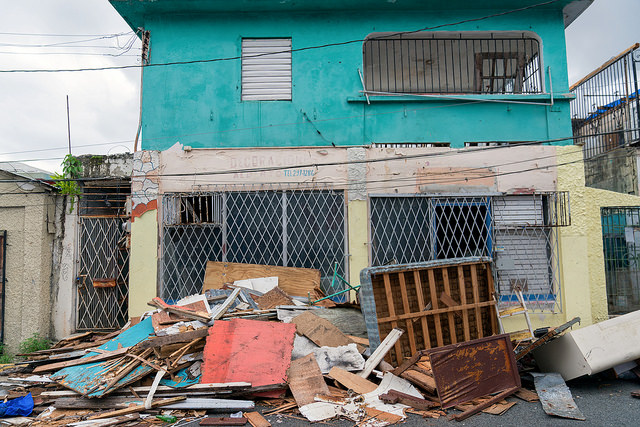 A couple of months ago, I wrote about a woman in Puerto Rico who posted a picture of her chicken soup in a Facebook group for lovers of a kitchen gadget called the Instant Pot. We’ve heard a lot of news about the devastation and sluggish pace of recovery in Puerto Rico, but I wanted news of one particular Puerto Rican. So yesterday I called her to get an update.
A couple of months ago, I wrote about a woman in Puerto Rico who posted a picture of her chicken soup in a Facebook group for lovers of a kitchen gadget called the Instant Pot. We’ve heard a lot of news about the devastation and sluggish pace of recovery in Puerto Rico, but I wanted news of one particular Puerto Rican. So yesterday I called her to get an update.
Monica Diaz and her two children sleep in one room, the only room in the house with a crack-free ceiling. When Hurricane Maria hit Puerto Rico on September 20th, it split Diaz’s roof. “The roof literally broke in four pieces,” she says. So whenever it rains, the house floods.
Diaz’s home has been without power for nearly three months. The lights went out during Hurricane Irma. That storm brushed past the island rather than broadsiding it, but the winds were still strong enough to knock out power to more than a million residents. At night, Diaz runs a generator, which powers an air conditioner. Sleeping without it would be impossible. The heat is oppressive, and the AC helps muffle the drone of her neighbors’ generators. Diaz’s generator also keeps the chest freezer cold. She lined the bottom with water bottles. At night, they freeze. During the day, when she turns the generator off, the frozen bottles keep her other groceries cool.
Diaz doesn’t know how much longer she will be without electricity. The grid is running at about half its capacity, and last week one of the companies hired to help repair the lines stopped work because of unpaid bills. “Do you have power?” has become one of the island’s most popular questions, she says.
Still, Diaz recognizes that she is one of the lucky ones. When Maria made landfall, she was staying with her parents. Their house suffered little damage, and their industrial-sized generator kept the power running. Diaz made a pot of chicken soup. “When a hurricane hits, you have to cook everything you have in the refrigerator because you don’t know how long you’ll be without power,” she says. “Those days after the hurricane, those were the best neighborhood barbecues.”
But the party didn’t last long. After a couple of days, fuel for the generator became hard to find. Food was scarce too. “Everything was stuck in the ports,” Diaz says.
Diaz works for a large technology company that has been good to its employees. A week after the Maria hit, the company called a staff meeting. Two armed guards showed up with a bag of cash. Each employee received $1,000 in $20 bills, “for whatever we needed,” Diaz says. And when Diaz and her coworkers went back to work, the company let them bring their families into the office each day. The building had a generator, water, and internet. “All the conference rooms were taken over by the kids,” she says.
Outside the office, however, the situation remained bleak. In early October, Diaz’s company offered to evacuate its employees. Diaz was still living with her elderly parents, who had no power or water. She was worried about them, and about her son, who has autism. “I jumped on the opportunity,” she says. The family spent a month at a hotel in Atlanta. “It was so great,” she says. Diaz would have stayed longer, but she was anxious about her house and all the school her kids were missing. So she loaded up on flashlights and battery-operated fans and headed back to the island.
Diaz and her kids moved back into their house last weekend. She is trying to get the roof fixed, but even that seemingly straightforward task has proven difficult. She requested money from FEMA, but was denied because she wasn’t living in her home when the inspector arrived. FEMA referred her to the small business administration, and she applied for a loan. But that request was denied too. Diaz filed a claim with her insurance company — her policy is supposed to cover hurricane and flood damage — but she has yet to receive a response. So she used her own money to buy three large tarps. Now she’s searching for someone to install them.
The roof ordeal has left Diaz exhausted and frustrated. She hopes to appeal FEMA’s decision, but she doesn’t know when she’ll find time. Diaz works for an international company, so her workload hasn’t diminished. And she has to leave the office early each day to pick up her kids. “I just don’t have any time to waste,” she says. Everyone she has spoken with has been kind, but they all say essentially the same thing: the system is the system and everyone must follow the protocol — even after a hurricane.
***
Image courtesy of Lorie Shaull via Flickr.
Monica is a super mom and a survivalist.I am very proud of her.Puerto Rico at present is unlivable and many good ,hard working people are leaving